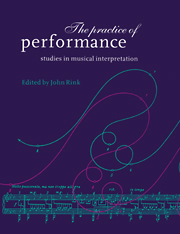Book contents
- Frontmatter
- Contents
- Preface
- PART ONE FUNDAMENTALS
- PART TWO STRUCTURE AND MEANING IN PERFORMANCE
- PART THREE PERFORMANCE AS PROCESS
- 9 Performance and analysis: interaction and interpretation
- 10 Analysis and the act of performance
- 11 The pianist as critic
- 12 Playing in time: rhythm, metre and tempo in Brahms's Fantasien Op. 116
- Index
10 - Analysis and the act of performance
Published online by Cambridge University Press: 10 October 2009
- Frontmatter
- Contents
- Preface
- PART ONE FUNDAMENTALS
- PART TWO STRUCTURE AND MEANING IN PERFORMANCE
- PART THREE PERFORMANCE AS PROCESS
- 9 Performance and analysis: interaction and interpretation
- 10 Analysis and the act of performance
- 11 The pianist as critic
- 12 Playing in time: rhythm, metre and tempo in Brahms's Fantasien Op. 116
- Index
Summary
Every true work of art has but one true performance, its own particular to it …
The hand may not lie; it must follow the meaning of the voice-leading.
Heinrich SchenkerThis book is testimony to the increased scholarly attention that musical performance is receiving, not least from theorists and analysts. In the early part of the twentieth century, some theorists – including Hugo Riemann and Heinrich Schenker – were deeply engaged with issues of performance; but for several decades the pendulum swung away from such practical concerns, at least in American scholarship. Performance practice became the preserve first of historical musicologists and then of practitioners in the budding historical performance movement. The current renewal of interest in this area among theorists is related, I believe, to a much broader intellectual trend, one which refuses to regard musical structure and its discovery by means of analysis as ends in themselves. One could call this trend ‘post-structuralist’ in the literal sense. At its most radical, post-structuralism has devalued structure, and has even denied that structure is a relevant issue for certain kinds of music (particularly opera). While most theorists and analysts are unwilling to attack the foundations of their disciplines in this way, many have been drawn to issues which relate structure to other aspects of music: to the history of musical style, for instance; or to human cognitive capacities; or – of most immediate relevance here – to performance practice.
- Type
- Chapter
- Information
- The Practice of PerformanceStudies in Musical Interpretation, pp. 217 - 240Publisher: Cambridge University PressPrint publication year: 1995
- 16
- Cited by



